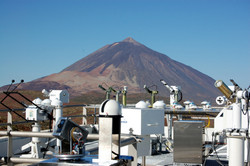Global network studies air quality and climate change
Radiation and atmospheric components like aerosols, clouds and greenhouse gases influence climate change and air quality, impacting negatively on health and the environment. Free access to high-quality data could boost research efforts to curb these negative effects. The ACTRIS(opens in new window) (Aerosols, clouds, and trace gases research infrastructure network) project represented a coordinated research infrastructure providing long-term data from the Earth Observation System (EOS). The EOS conducted long-term global observations of the land surface, biosphere, atmosphere and oceans of the Earth. ACTRIS aimed to provide global access to EOS, enabling scientists from around the world the opportunity to fully exploit it for research on climate change and air quality. The project focused mainly on training and development of standardised techniques, tools and infrastructures. These were made compatible with all experimental processes in order to accommodate researchers around the world. The project partners developed new integration tools to fully exploit the use of multiple techniques at the ground-based stations. They focused in particular on the calibration, validation and integration of satellite sensors and improvement of the parameters used in global- and regional-scale climate and air quality models. ACTRIS also provided guidelines on best practice for data collection and management and promoted the development of innovative observation technologies for aerosols, clouds and trace gases, through new partnerships. A dedicated data centre gave free access to climate and air quality research data on its network and provided support for observation data reporting. The data centre also provided tools to improve and facilitate the use of atmospheric observations, with an emphasis on combining key atmospheric variables and their parameters for climate change assessments and weather forecasting. ACTRIS provided essential capacity in improving observations of the aerosol and trace gases within international networks. It contributed to the harmonisation of observations, quality assurance, and essential development and implementation of new or improved measurement protocols. It also played a crucial role in the implementation of monitoring strategies of these international programmes. Thanks to its integrated approach, ACTRIS will become a major reference infrastructure. Stronger links with the United States and collaboration with small and medium-sized enterprises (SMEs) will drive the development of innovative technologies to validate air quality and climate change policies. This will also be advantageous to EU SMEs in competition for markets worldwide.







